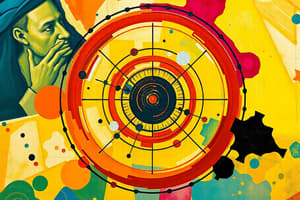Podcast
Questions and Answers
What main idea does Darwin's theory of evolution promote regarding the existence of humans?
What main idea does Darwin's theory of evolution promote regarding the existence of humans?
- Humans exist separately from the laws of science.
- Humans are a result of divine creation.
- Humans evolved from pre-existing organisms. (correct)
- Humans are fundamentally different from other organisms.
Which aspect of Freud's work has been criticized as lacking sufficient evidence?
Which aspect of Freud's work has been criticized as lacking sufficient evidence?
- The scientific basis of psychoanalysis. (correct)
- His method of dream interpretation.
- His study of human rationality.
- His theories on human drives and emotions.
Which civilization is NOT mentioned as part of the intellectual revolution in Meso-America?
Which civilization is NOT mentioned as part of the intellectual revolution in Meso-America?
- Inca civilization.
- Olmec civilization. (correct)
- Aztec civilization.
- Maya civilization.
What was a significant contribution of the Indian civilization mentioned?
What was a significant contribution of the Indian civilization mentioned?
Which method did the Maya civilization utilize for their record-keeping?
Which method did the Maya civilization utilize for their record-keeping?
Which of the following statements accurately reflects the significance of Copernicus' heliocentric model?
Which of the following statements accurately reflects the significance of Copernicus' heliocentric model?
What was the primary societal dependency during Copernicus' time before the acceptance of the heliocentric model?
What was the primary societal dependency during Copernicus' time before the acceptance of the heliocentric model?
Which of the following scholars is NOT considered a successor of Copernicus in advancing astronomical ideas?
Which of the following scholars is NOT considered a successor of Copernicus in advancing astronomical ideas?
What impact did Galileo's work have on society's perception of science?
What impact did Galileo's work have on society's perception of science?
What field is Charles Darwin recognized as pioneering?
What field is Charles Darwin recognized as pioneering?
Flashcards are hidden until you start studying
Study Notes
Introduction on Intellectual Revolutions
- Intellectual revolutions transform thoughts, beliefs, and social institutions through new ideas and principles.
- The Scientific Revolution positioned science and technology as pivotal in reshaping intellectual thought.
Key Intellectual Figures
-
Nicolaus Copernicus (1473 - 1543)
- Polish astronomer proposing the heliocentric model, placing the sun at the universe's center.
- Challenged the geocentric model which positioned Earth as the center of the universe.
- Laid groundwork for future astronomers like Tycho Brahe, Johannes Kepler, and Galileo Galilei.
- His ideas led to broader acceptance of astronomy over astrology within society.
-
Charles Darwin (1809 - 1882)
- English scientist recognized as the founder of evolutionary biology.
- Authored "Origin of Species" and "Descent of Man," introducing the concept of natural selection.
- Argued humans evolved from earlier organisms, challenging creationist views.
- Emphasized the equality of humans with other life forms.
-
Sigmund Freud (1856 - 1939)
- Austrian neurologist noted for pioneering psychoanalysis to understand the human mind.
- Disputed Enlightenment views that emphasized rationality and emotional control.
- Many modern scientists regard Freud's theories as pseudoscience due to lack of empirical evidence.
Intellectual Revolutions in Meso-America
- Maya Civilization
- Advanced in astronomy, engineering, and developed their writing system.
- Inca Civilization
- Known for creating extensive paved roads and irrigation systems.
- Aztec Civilization
- Implemented mandatory education for children and innovative farming techniques.
Intellectual Revolutions in Asia
- Indian Civilization
- Notable for advancements in steel production and Ayurveda (traditional medicine).
- Indonesians
- Constructed Candis, significant religious structures influenced by Buddhist and Hindu traditions.
- Japanese
- Developed Kampo medicine, rooted in earlier Chinese practices.
Intellectual Revolutions in the Middle East and Africa
- Ibn al-Haytham
- Known as the 'Father of Optics' for studies on light.
- Jabir ibn Hayyan
- Early contributions to alchemy and metallurgy.
- Ibn Sina
- Significant works in medicine, particularly relating to infectious diseases.
- Egyptian Civilization
- Landmark achievements in metallurgy and knowledge dissemination through Alexandria.
Information Revolution
- Redefined social, economic, and political roles of information.
- Enabled major advancements in modern science impacting every societal layer.
- Facilitated government transparency and online connectivity.
- Telecommuting emerged due to the revolution, reducing barriers between employees and employers.
- Initiated by the development of language, writing, and printing, establishing documentation and distribution of knowledge.
- Innovations in computers and communication technologies enhanced information storage, processing, and sharing.
Summary of Major Scientific Revolutions
- Includes the Copernican, Darwinian, Freudian, and Information Revolutions, each significantly shaping human understanding and society.
Studying That Suits You
Use AI to generate personalized quizzes and flashcards to suit your learning preferences.




